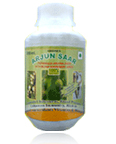Epistaxis or Nose Bleeding Herbal RemediesEpistaxis or nose bleeding is a common complaint and it is rarely life-threatening. Most nosebleeds are benign, self-limiting and spontaneous. A nosebleed occurs when the membranes lining the inner nose are disturbed or irritated enough to cause abnormal bleeding. The most common causes of nosebleed are a breakdown in the membranes lining the nose. Pricking or rubbing the nose can also cause a nosebleed or epistaxis. Other factors leading to epistaxis may include inflamed nasal membrane due to allergies or an infection, injury to the face or nose, re-bleeding from an area of a previous nosebleed, high altitude, drug abuse, high blood pressure etc. Epistaxis or nose bleeding has been reported to occur in upto 60% of the general population. The incidence peaks at ages younger than 10 years and older than 50 years. Epistaxis also appears to occur more often in males than in females. Bleeding from inside the nose is a common complaint presenting an emergency. Epistaxis is often a frightening sight, if the patient is a kid. Epistaxis can occur due to hypertension, as commonly seen in old age. Other factors responsible for epistaxis may include some heart diseases, pregnancy, bleeding disorders and acute general infections like typhoid, pneumonia, malaria, dengue fever, measles etc. In epistaxis, bleeding usually occurs from only one nostril. If the bleeding is heavy, the blood can fill up the affected nostril and overflow into the nasopharynx. Blood can also drip into the back of the throat or down into the stomach. The affected person has to spit up or even vomit blood. Signs and symptoms of epistaxis or nose bleeding may include dizziness, weakness, confusion and fainting. Other symptoms include excessive blood loss from nosebleeds and additional bleeding from other parts of the body such as in the urine or bowels, may indicate an inability of the blood to clot. Most nosebleeds occur during the winter in cold or dry climates. If a person is prone to epistaxis, he or she may use a humidifier at home. Petroleum jelly or a saline nasal spray also helps to keep nasal passages moist. Nose pricking should be avoided. If epistaxis is related to another medical condition, such as liver disease or a chronic sinus condition, doctor should be consulted. Smoking should be stopped as it contributes to nasal dryness and irritation. Allopathic medicines are also beneficial, but these lead to various side-effects. According to Ayurveda, there are numerous herbs for the treatment of epistaxis. The herbal remedies help to bring an end to nose bleeding. Epistaxis or nosebleeds can range from minor bleeds with a few drops to major hemorrhages. Many people are prone to nosebleeds and others have occasional nosebleeds. According to Ayurveda, high blood pressure involves all the doshas, the heart and the blood vessels. Symptoms of derangement of vata dosha, mainly that of 'vyana vayu' are observed in high blood pressure. The treatment is to correct the balance of vata dosha. Pitta visiation is also seen and should be treated. People with vata and pitta imbalance, are more prone to hypertension than any other. Unprocessed anger, frustration, irritability, anxiety and fear leads to hypertension. Arjuna can help lower hypertension and used as a natural remedy for nose bleeding. Amla which is also known as Indian Gooseberry is popularly used as an herbal remedy for epistaxis or nose bleeding. Herbal Cure Pack for Epistaxis (Nosebleed)
Arjun Saar -Terminalia arjuna juice with Pure Indian Gooseberry juice -is the Best of all heart care herbal supplementsTerminalia arjuna is tree which has special role in heart care. The bark of this tree contains special micro-nutrients, enzymes, vitamins and anti-oxidants which provide natural strength to heart muscle. Arjun Saar is juice of Arjuna bark mixed with Amla Berry juice. Amla berries are nature's richest source of best anti-oxidants and richest source of natural Vitamin C on earth. This makes Arjun Saar a combination of best heart care herbs described in ancient Ayurvedic texts as the most effective herbal remedies for heart care, high cholesterol, blood pressure, epistaxis and heart problems like congestive heart failure or weak heart. Arjun Saar is the safest choice to the problems like hypertension, high cholesterol, fatigue, blocked coronary arteries. This makes it one of the best herbal remedies for heart care. It tones up and strengthens heart muscle and arterial system. It is a best combination to take care of above mentioned problems and that too without any side effects. Addition of each herb in Arjun Saar has a specific purpose and the one who uses it regularly can definitely realize its benefits. How to use - 30 ml twice daily, empty stomach with equal water or apple juiceRole of Arjun Saar in heart care -
Amla Juice - The purest Amla Juice - 'Amla Saar'
Amla Saar-Pure Indian Gooseberry Juice Amla is perhaps the single most often mentioned herb in "Charak Samhita"- Ancient Indian Ayurvedic medicine literature (500 BC) The fruit is has the highest content of vitamin C of any natural occurring substances in nature. Amla is most useful treatment of ulcers and hyperacidity. Amla builds immune system to fight against all kind of viruses like that of Hepatitis, AIDS, Influenza and many others.
Dosage of Amla juice3 teaspoonfuls twice daily, Morning and Evening with equal water. |

Ayurveda Book
This book on Ayurveda is meant for people interested to know about basics concepts of Ayurvedic healing and learn ayurveda concepts. Though there are many books Read More My SitesReal Testimonials
Connect with us |
||||||||||||||||








